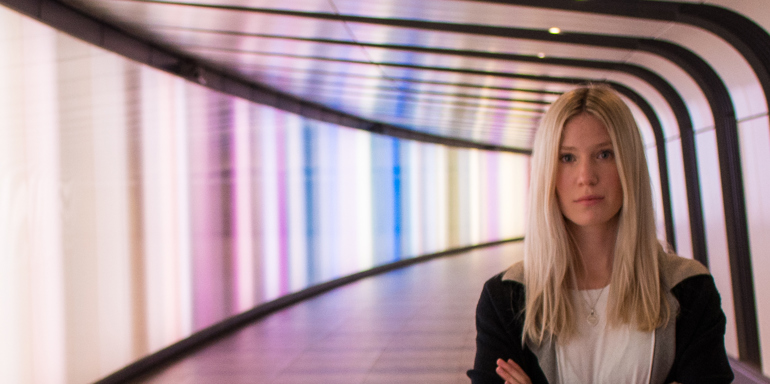
Course Studied: BA (Hons) Music (Production)
Year of Graduation: 2014
Top Career Highlights:
- Landing the role of technical producer for BBC Radio 3 in London
- Receiving an exclusive contract to release music for an online stock library
- Performing a live session and interview with BBC Introducing
Kate Lloyd currently works as a Technical Producer for BBC Radio 3. A former student on our Music Production programme, she balances her time composing original material under the alias 'Kloyd' alongside creating bespoke production music for moving image.
Below, Kate comments on her portfolio career, the underrepresentation of women in the music industry and Channel 4’s decision to make Leeds a National HQ.
Could you tell us a little bit more about your electronic music project ‘Kloyd’?
Sure! Kloyd is my artist alias that I release music under commercially. I produce electronica which is downtempo, relatively chilled and mainly instrumental, drawing inspiration from artists such as Bonobo, Four Tet and Air. I've been releasing my music as 'Kloyd' since 2017 and hope to continue pushing more new music in the future!
You’re a composer of bespoke production music for a variety of moving image media. What does that work look like in practice?
I compose a variety of electronica and orchestral music for stock media companies which is then licensed by video makers and producers for short films, adverts, online marketing videos (anything and everything which is moving image based!). I have an exclusive contract with one company and license through a few non-exclusive stock sites too. You rarely get to see (hear) where your music is placed but it's a good side earner and a great opportunity to get music out there for multiple use.
How did studying Music Production at Leeds Conservatoire prepare you for work in the wider industry?
The course provided a fantastic broad range of resources and modules to study including sound engineering, composition, events and marketing which gave me the fundamental industry skills and training to get started.
The lecturers were (and are!) such great tutors to learn from as most, if not all are actively working in the industry themselves. They offered first-hand experience and advice on how to use my portfolio of work and new knowledge to launch a career with many avenues to explore. I wouldn't have got to where I am now if I hadn't studied the Music Production degree - I have a lot to thank Leeds Conservatoire for!
You currently work as a technical producer for the BBC. What does this role involve?
My main duty is to operate the broadcast studios for live programmes on BBC Radio 3. So I control all the sound which involves balancing the presenters, newsreaders and playing in the music. Another fun part of the job is working on the outside broadcasts such as The Proms where I'll assist with the rigging of equipment and mic placement - I'm not senior enough to be balancing these but maybe one day! I also do lots of concert music editing and mix packages for pre-recorded tapes to be broadcast using the software Sadie.
A recent Guardian article suggested that just 5% of audio engineers are women. What opportunities are there for women working in this area? Do you think the situation is changing?
It's a shocking statistic but not at all surprising. Fortunately for us females, the awareness of this imbalance is steadily on the rise which is creating more opportunities than ever before to help these roles become more accessible for women. Whilst the industry still has a long way to go, platforms such as PRS Foundation’s Women Make Music and ReBalance are a couple of initiatives who are championing gender balance in the industry which will (in time) change the traditional landscape as we know it! As women are significantly unrepresented in the industry, the work they conduct is essential to giving women a voice, support and opportunity to lead careers in what has been a predominantly male dominated industry for many years.
Your recent work (tracks such as ‘Glow’ and ‘Aperture’) has been picked up by BBC Introducing in West Yorkshire. What do you attribute to its initial success?
I think it's a combination of two things really. The first being that I'm a female creating electronic music. Even though there are many of us doing it, stereotypically women in music are less known for producing electronica so I believe BBC Introducing are eager to encourage, represent and support those of us that are! The second being that the music itself is a trending genre, particularly amongst the younger demographic!
Channel 4 is in the process of creating a new National HQ in Leeds. How important is this for the city?
Hugely! When I saw the news Leeds had won the bid I was so happy. Leeds has had so many big, positive changes in recent years and the council have invested so much into its development, making it the diverse, vibrant and creative place it is now. Being home to Channel 4's HQ is another feather in the city's cap and will help propel Leeds even further with that development, opening many doors and opportunities for the large and expanding creative hub of Loiner's.
What’s coming up next for you in terms of projects or releases?
I'm releasing an album next year as 'Kloyd' which I'm really excited about and hopefully i'll start performing live gigs as that's not something I have done much of! Watch this space :)







